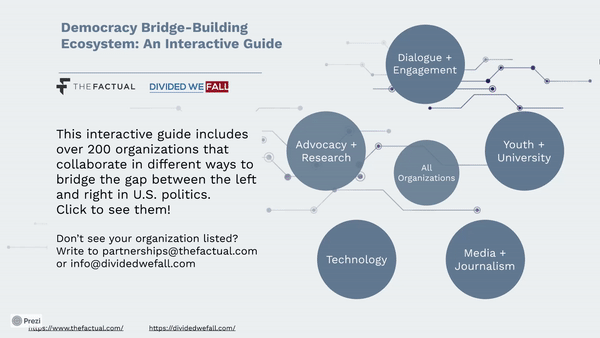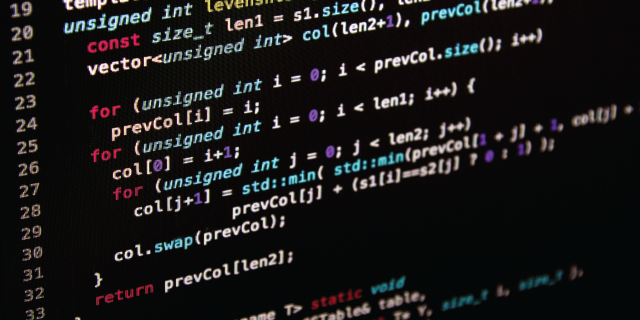When Demosthenes was asked what to do about the decline of ancient Athens, he is said to have replied: “Do not do what you are doing now.” So, although there is not much we can agree on in 21st-century America — given historic polarization, gridlock, partisanship, and, at times, incivility — perhaps we can agree with Demosthenes. Our country is hurting. And while there is not an easy answer regarding what to do about any of these issues, we have to try something different.
In some ways, our problem today is a problem of faith. Do we, the citizens, still believe in the ideals that defined America — liberty, equality, justice, and unity? And while we have always been an imperfect nation, are we willing to fight to make our country a little bit more perfect? Or would we rather succumb to the hysteria of the moment and watch or, worse, participate in the decline of our nation and its ideals?
We are here today to tell you that some of us believe the nation is worth fighting for. We believe the nation can be saved and will be by small and heroic acts of normal people — things like talking civilly with someone you disagree with, trying to understand someone else’s views, reading and learning about different perspectives, and voting for, donating to, and volunteering for elected officials that will do the same. If you do not believe us, look no further than the thousands of organizations that make up the bridge-building ecosystem — a network of Americans trying to cross the divide and move the country forward. While they may not always agree, they are dedicated to solving what is wrong with America based on what is right with America.
The Democracy Bridge-Building Ecosystem
Just as Alexis de Tocqueville was impressed by the “spirit of association” in 19th-century America, the strength of the democracy bridge-building ecosystem is in its numbers. A few organizations have started to put together lists of the organizations in this space, the most comprehensive of which is Princeton’s Bridging Divides Initiative, which lists over 3,000 organizations focused on building community at the local, regional, and national levels. Others include the #ListenFirst Coalition by the Listen First Project and the Bridge Alliance. Whatever way you slice it, all across the country organizations are standing up to unite the red and blue states of America.
For those who are new to the Democracy Bridge-Building Ecosystem, it might be hard to decipher what different organizations do and why they do it. There appear to be many organizations with similar goals yet minimal cooperation amongst the ecosystem. For these reasons, we have put together a first-of-its-kind Democracy Bridge-Building Ecosystem framework. As with any framework, it is imperfect. We accept all faults and welcome your feedback in the comments below.
Please check your email for instructions to ensure that the newsletter arrives in your inbox tomorrow.
Below are five categories that encompass the broad range of activities such organizations undertake. The categories are not mutually exclusive, nor do all organizations fit into each category neatly. However, we believe this framework can be a first step toward growing participation and collaboration across this ecosystem.
Dialogue and Engagement
Organizations in this category focus on bringing different types of people together. Sometimes it is over dinner (Make America Dinner Again and Resetting the Table) or in a living room (Living Room Conversations) or cafe (Conversation Cafe). Sometimes it is for online conversation, and other times it is facilitated in person (Braver Angels) or through public events (Common Ground Committee). These interventions are based on Intergroup Contact Theory, that it is harder to demonize the other when we know them — when we have (sometimes literally) broken bread with them. They attempt to break people out of echo chambers — social, geographic, or cyber — and expose them to people unlike themselves.
Youth and University
Organizations in this category look to the next generation to create the change that we wish to see. They believe, as Henry Adams put it, that a teacher affects eternity. They are at high schools (Youthquake and American Exchange Project), colleges and universities (BridgeUSA and Youthivism), and in religious communities (Interfaith Youth Corps). Some even target faculty (Heterdox Academic). They aim to build a skillset of civility, bipartisanship, and service (Service Year Alliance) against the tide of countervailing forces and winds. They believe that generational change is our last best hope for achieving change. Promising initiatives include the Millennial Action Project and Generation Nation.
Advocacy and Research
Organizations in this category engage in research to help diagnose the problems we face and advocacy to try to support policies to remedy them. They believe facts and evidence are necessary to know what the problem is and what the problem is not. They believe that the political class — politicians, activists, donors, and media — are both the problem and the solution. They include think tanks (Bipartisan Policy Center) and nonprofits (Civil Politics) and are often affiliated with universities, such as Stanford’s Center for Deliberative Democracy and Arizona State University’s National Institute for Civil Discourse. They produce reports, like More in Common’s Hidden Tribes report, which informs and improves the debate about how to take action. And sometimes, they even get elected officials involved, like No Labels, which inspire efforts like the Problem Solvers Caucus. These efforts go to the heart of the matter, armed with fact-based research, to address the problem at its core.
Media and Journalism
Organizations in this category, such as Divided We Fall, produce content that promotes bipartisanship and civility. They might subscribe to the notion by Alexis de Tocqueville that nothing but a newspaper can put the same thought at the same time before a thousand readers. Despite a competitive media environment that is driven by profit motives, clickbait, and infotainment, they believe that people want to hear balanced opinions and analysis, genuine factual reporting, and hard-hitting questions directed at both sides. These efforts include original written journalism content (Pairagraph), newsletters (The Thread), podcasts (Pantsuit Politics), and film (Listen Courageously). They sometimes include aggregating existing journalism from multiple perspectives (Feedly and The Flip Side). At times, they reach mass media audiences, like USA Today’s Today’s Debate. They are producing the content we need, even if it is not always the content we deserve (or always want).
Technology
Organizations in this category, such as The Factual, believe that technology can help solve our problems. They include services that aggregate news from different perspectives (AllSides and Ground News), rate news based on factuality (Nobias), or create a platform to present both sides of an argument (ProCon). They often ask their users to argue their point of view (Debate.org and Kialo), change someone else’s (Change My View), or discuss offline (Civi). Sometimes, they promote civic engagement with elected representatives and governments (Polimorphic, ActiVote, and Prytany). They are fundamentally techno-optimists. But they are mindful of the well-documented issues with technology platforms, attention-optimizing algorithms that feed you more of what you want to see, and misinformation and foreign interference.
Please check your email for instructions to ensure that the newsletter arrives in your inbox tomorrow.
Standing Together
Eleanor Roosevelt once noted: “A democratic government represents the sum total of the courage and the integrity of its individuals. It cannot be better than they are.” The fate, then, of the Democracy Bridge-Building Ecosystem depends on you. If you want to pitch in, here are some ways to do it.
- Get Involved: Our framework is intended to be a map for interested and engaged citizens like you. Think about which organizations and missions align best with your interests and values and get involved! Sign up for their newsletters, follow them on social media, and comment on their platforms and articles. These organizations need active participation to make an impact, so get involved today!
- Email Us: We published the framework above as a starting point. It represents our best analysis of these organizations, their efforts, and their impact. With it, we are hoping to start a conversation between and among these groups about how we might work together and what needs exist unfulfilled. If your organization is listed here, reach out! If we have you listed wrong, let us know! If we failed to include you, tell us where you belong! We are standing by to hear from you.
- Reach Out: If you are like most people, you probably think you are not the problem, but rather it is your neighbor/uncle/coworker/Facebook Friend/etc. But consider, perhaps, that they might think the same about you. We think there is no better way to learn and grow than by engaging with the other, and the organizations and tools above are the perfect starting point. Perhaps you will change someone’s mind, or even, dare we say it, they might change yours. You never know where that conversation might lead. They might just thank you for it one day.
At the end of the day, we the people are the masters of our own fate. We must take it upon ourselves to restore the fabric of our republic to ensure that it lasts another 250 years. Thankfully, William James shows us the way:
Civilization is always in need of being saved. The nation blest above all nations is she in whom the civic genius of the people does the saving day by day, by acts without picturesqueness; by speaking, writing, voting reasonably; by smiting corruption swiftly; by good temper between parties; by people knowing true men when they see them, and preferring them as leaders to rapid partisans or empty quacks.
Join the Democracy Bridge-Building Ecosystem today! We hope to see you there.
Yours in civility,
Joe and Arjun
Joe Schuman is the founder and editor-in-chief of Divided We Fall, a non-profit news publication working to provide bipartisan dialogue for the politically engaged. Arjun Moorthy is co-founder and CEO of The Factual.
Interested in hearing more from The Factual? Our daily newsletter uses the credibility algorithm to analyze 10,000+ articles every day to highlight the very best journalism on trending topics.
Want to score articles yourself? Our browser extension and our microsite IsThisCredible.com let you drill down into any article and see why we score it a certain way.



